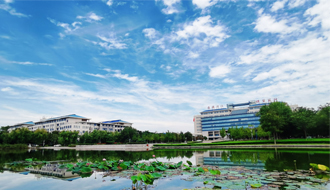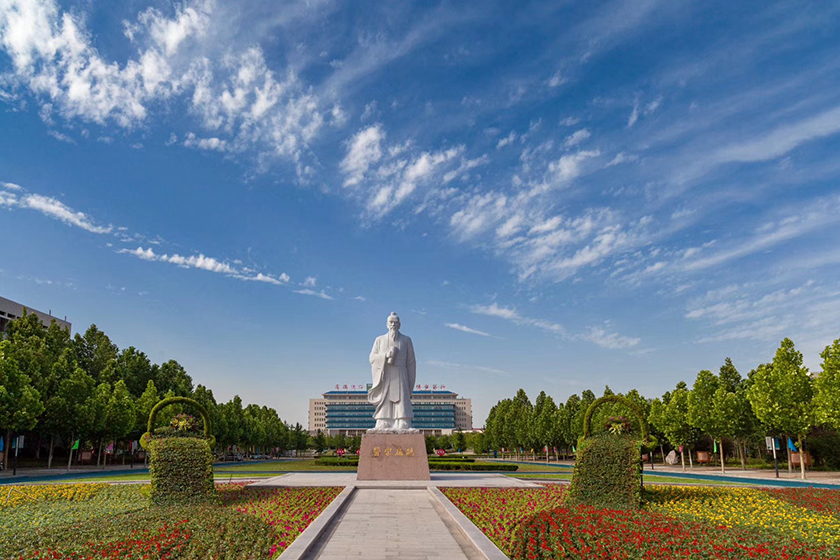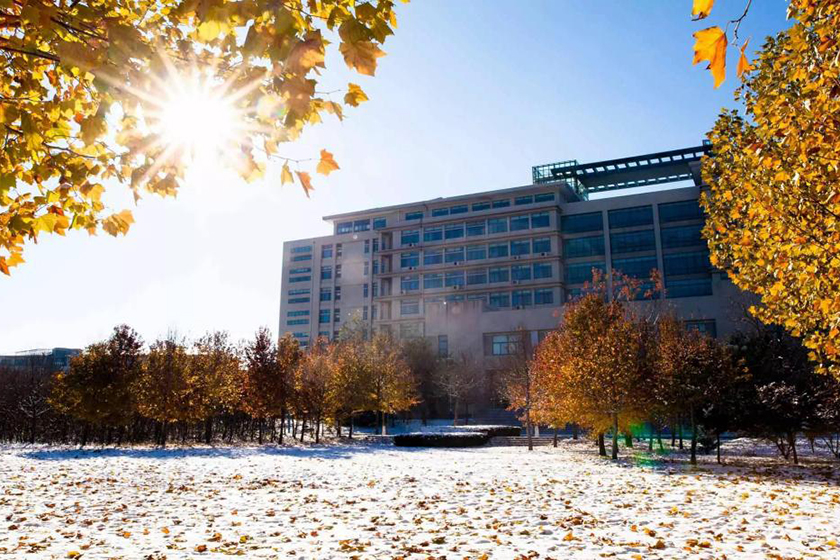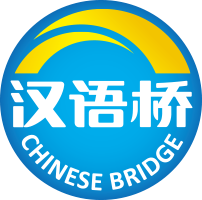INTRODUCTION TO SHANDONG UNIVERSITY OF TRADITIONAL CHINESE MEDICINE
山东中医药大学简介


山东中医药大学创建于1958年,1978年被确定为全国重点建设的中医院校,1981年成为山东省重点高校,是教育部本科教学工作水平评估优秀学校、山东省人民政府和国家中医药管理局共建中医药院校、山东省应用基础型人才培养特色名校、山东省省级文明校园、山东省高水平学科和高水平大学。学校在省属高校中拥有国家重点学科最多,首批获得硕士、博士学位授权,首批成为国家“973”项目首席承担单位,硕士点数量位居全国同类院校前列。
学校坚持以习近平新时代中国特色社会主义思想为指导,坚持“两个确立”,做到“两个维护”,紧紧围绕立德树人根本任务,坚持社会主义办学方向,全面贯彻党的教育方针,秉承“厚德怀仁、博学笃行”的校训,坚持“以文化人、厚重基础、注重传承、勇于创新”的办学特色,传承精华、守正创新,为党育人、为国育才,经过六十余年几代人辛勤耕耘和不懈奋斗,培养出十余万中医药和健康服务相关专业人才,综合办学实力和社会影响力显著提升。
学校2007年由济南市历下区主体迁入扁鹊故里——长清,总占地2039亩,建筑面积56万平方米。全日制在校生23000余人,其中本专科生18000余人,研究生近4800人。图书馆馆藏图书208.9万册、电子图书78.1余万册、古籍善本近3万册,为山东省古籍重点保护单位。学校设置17个教学机构、5个科研机构、4个教辅机构,有山东中医药大学附属医院、山东中医药大学第二附属医院、山东中医药大学附属眼科医院3所直属附属医院、12所非直属附属医院、31所教学医院。现有10家山东省研究生联合培养基地、17家国家中医住院医师规范化培训基地,1个国家级实验教学示范中心、1个国家级大学生校外实践教育基地。
学校坚持厚重基础、注重特色,努力培养高素质中医药人才。现有35个本科专业,涉及医、理、文、工、管、法、教育等学科门类,其中27个国家级省级一流本科专业,8门国家级一流本科课程。有3个博士学位授权一级学科,9个硕士学位授权一级学科,3个国家重点学科。中医学入选山东省“高峰学科”,中药学、中西医结合入选山东省“优势特色学科”。在2021软科中国最好学科排名中,中医学位列第6,中西医结合位列第5,临床医学持续保持在ESI全球前1%。先后荣获全国创新创业典型经验高校50强,第二届全国《黄帝内经》知识大赛总决赛总冠军,第四届中国“互联网+”大学生创新创业大赛金奖,首届全国大学生中西医临床技能大赛团体特等奖。连续三年蝉联中国大学生服务外包创新创业大赛一等奖。先后涌现出一批荣获“中国青年五四奖章”“全国三好学生”“中国大学生自强之星标兵”等称号的优秀学生。
学校坚持师德为先、人才引领,打造实力雄厚人才师资队伍。现有教职医护员工3900余人,博士生导师236人,其中兼职导师87人,硕士生导师1011人,其中兼职导师518名。荣获“国医大师”荣誉称号4人,“全国名中医”5人,“岐黄学者”5人,“青年岐黄学者”2人,全国中医药杰出贡献奖获得者2人,“973”项目首席科学家1人,全国优秀教师8人,全国中医药高等学校教学名师2人,“泰山学者”攀登计划专家2人,“泰山学者”特聘专家10人,“泰山学者”产业领军人才1人,“泰山学者”青年专家7人,省部级有突出贡献的中青年专家27人,享受国务院特殊津贴专家53人,入选“全国高校黄大年式教师团队”2个。建校以来,连续两届获国家教学成果二等奖,荣获省级以上教学成果奖72项。
学校坚持科技驱动、协同创新,推动科研创新取得丰硕成果。现有中医学、中药学、中西医结合3个博士后科研流动站,1个教育部重点实验室,1个国家中医心血管疾病临床医学研究分中心,3个国家级区域中医诊疗中心,6个国家中医药管理局三级重点实验室,2个国家中医药管理局重点研究室,2个全国学术流派传承工作室,拥有国家中医临床研究基地、国家重大新药创制平台(山东)中药单元平台。有山东省重点实验室、山东省工程技术研究中心等省级科研创新平台27个。“十三五”以来,共承担厅局级以上科研课题1230余项,其中国家级项目137项 ,2018、2019年连续两年首位获得国家科技进步二等奖,共获得山东省科技进步一等奖4项。建校以来,获国家级和省部级一等奖奖励的科研成果共计30项。
学校坚持科教融合、产教融合,主动融入国家地方重大战略。与济南市签署战略合作协议,建成山东中医药大学科研创新大楼。与济南市、澳门科技大学、南粤集团共建鲁澳中医药产业研究院,打造中药质量研究、中药新药及其系列产品研发领域国际合作中心。面向中医药现代化、国际化,与济南市共建国际医学科学中心科教融合实践基地。与青岛市共建青岛中医药科学院、青岛海洋中药研究院、附属青岛医院,打造中医药领域的高层次人才培养基地、重要的科技研发基地和先进的医疗服务基地。与鲁南制药和浪潮集团合作的基地获批山东省产教融合研究生联合培养示范基地。与临清市、惠民县等地方政府,与省药监局、省药学科学院等部门单位,与南京中医药大学、黄冈师范学院等院校,与鲁南制药、福瑞达等企业签署了系列战略合作协议,努力将教育教学优势、科学研究优势、中医药文化优势、医疗服务优势转化为健康产业创新发展优势。
学校坚持以文化人、以文育人,积极打造特色鲜明文化品牌。充分发挥“齐鲁文化、扁鹊故里、针灸发源地”“三张名片”优势,塑造独具特色的大学文化品格。通过举办尼山世界中医药论坛、中国(长清)扁鹊中医药文化节、扁鹊文化与中医经典传承发展国际论坛、第六届中医科学大会、第七届世界中西医结合大会、首届济南扁鹊论坛,叫响“扁鹊故里”文化品牌。通过承办全国性“泰山论灸”学术会议,广泛推广灸疗适宜技术。成立全国首家省级中医药文化协同创新中心,并成为山东省高等学校示范协同创新中心。获批省内首家中医药智库,成立儒医文化研究会。新中国成立以来规模最大最系统的中医药古籍整理保护计划项目《中华医藏》学术办公室挂靠本校。注重中医药文化传播,广泛开展“万名中小学生进校园”活动,山东省中医药博物馆获批为全国中医药文化宣传教育基地、山东省中医药文化旅游示范基地、山东省社会科学普及教育基地。
学校坚持开放办学,大力发展国际教育,不断推动中医药文化“走向世界”。 2001年,学校设立国际教育学院,是学校面向海外及港澳台地区的重要归口单位和推动中医药文化走向世界的重要窗口,负责招收和培养外国留学生、港澳台及华侨学生,开展本科、硕士和博士三个层次的学历教育及各类短期特色培训项目。学校加大中医药国际教育交流与合作,坚持“提质增效”,加强对外合作,积极开拓新的办学形式和办学方式。在中医药国际教育的对外传播中,立足我校中医药特色教育,多元化传播国际教育,分别与德国、荷兰、瑞士、美国、加拿大、巴西、澳大利亚、以色列、日本、韩国、马来西亚等国家和港澳台地区进行合作交流,吸引了来自世界五大洲不同国家(地区)的学生前来学习,以汉语为桥连接五洲学子,在推动中医药走向国际舞台、带领世界各国学习者共筑中医梦。
学校坚持大医精诚、厚德怀仁,不断提高中医药健康服务能力。附属医院是全国示范中医院、国家中医临床研究基地、国家中医药传承创新工程建设单位、国家药物临床试验机构、国家中医药考试工作基地、首批全国中医规培基地。第二附属医院是山东省首家省属中西医结合医院,被确定为全省中医治未病质量控制中心,牵头成立山东省中医治未病联盟;推进中西医康复联盟建设,立项中西医结合老年医学综合楼建设项目;获批国家中医药管理局省级中医药数据中心中医馆健康信息平台建设项目。附属眼科医院先后获批山东省首家三级甲等专科眼科医院、中西医结合眼视光与近视防控国际合作基地、国家眼耳鼻喉疾病临床医学研究中心山东省分中心、山东省眼视光质量控制中心。
学校坚持以习近平新时代中国特色社会主义思想为指导,积极推动学校内涵建设和高质量发展,努力在培养高素质中医药人才、推动中医药文化创造性转化创新性发展、服务“健康中国”和新时代社会主义现代化强省建设征程中争创一流、走在前列,奋力谱写国内一流中医药大学建设新篇章。

Shandong University of Traditional Chinese Medicine (SDUTCM) was founded in 1958, listed as one of the key state construction TCM higher-learning institutes in 1978, and approved as one of the key Shandong provincial universities in 1981. It is currently the only independent medical university in Shandong Province, and rated excellent in the national undergraduate education evaluation conducted by the Ministry of Education. It is among the first batch of “five preeminent featured universities” approved by Shandong provincial government. Among all the colleges and universities in Shandong province, it takes the lead in the number of the state key disciplines, in offering master’s and doctoral programs and post-doctoral research programs, and also in undertaking the state “973 Projects” as a chief organization.
SDUTCM adheres to the motto of “Cultivating virtues and harboring benevolence, learning extensively and practicing persistently”, exploits fully the advantages of traditional Chinese medicine, strengthens its connotation construction, and as a result forms its own educational features, namely “nurturing students’ minds by culture, consolidating their foundation, emphasizing knowledge inheritance, and encouraging innovation”. It has trained tens of thousands graduates with professional skills for the nation and society. They share something distinctive in common, for instance, honest-and-sincere personality, solid professional basis, down-to-earth work attitudes. Some of them have won national honorary titles, such as “National Three-Goods Students”, “Self-Reliance Star of Chinese University Students”, and “May 4th Youth Medal of Shandong Province”, etc.
SDUTCM has been striving for the goal of becoming one of preeminent featured universities. In 2007, the main campus moved from Lixia District, Jinan City, to Changqing District—— the hometown of Bianque ( a famous physician in ancient China), covering a total area of 122 hectares with a building area of 560,000 square meters. The facilities and equipment are valued at over RMB 192,765,000, and the library has a collection of 2,080,000 paper books, 781,000 electronic books and 30,000 rare ancient books. The library is a “Shandong provincial key protection unit of ancient books”. It has 17 colleges, 3 directly-affiliated hospitals, 12 indirectly-affiliated hospitals, 24 teaching hospitals, 97 clinical teaching bases, 10 Shandong graduates jointly-training bases. It has one national experimental teaching demonstration center and one national undergraduate off-campus education and practice bases.
SDUTCM works hard to train high-quality talents and TCM physicians by both cultivating virtues and encouraging learning. It has 35 undergraduate programs, involving the fields of medicine, sciences, humanities, engineering and management. Meanwhile, it has 3 first-rate doctoral degree authorization disciplines, including traditional Chinese medicine, traditional Chinese materia medica and combination of TCM and western medicine, entitled to confer 15 doctoral degrees. It also offers 8 first-rate master’s degree authorization disciplines, entitled to confer 44 master’s degrees, which involve all the second-rate disciplines of traditional Chinese medicine, traditional Chinese materia medica and combination of TCM and western medicine, which have already started to permeate to peripheral disciplines. Additionally, SDUTCM has been authorized to grant doctoral degrees in clinical medicine and master’s degrees in clinical medicine, traditional Chinese materia medica, pharmacy and biomedical engineering. At present, it has an enrollment of nearly 23,000 students, including nearly 18,000 undergraduates and over 4,800 postgraduates. SDUTCM attaches great importance to international academic exchange and cooperation. It has built long-term cooperative relationships with over 30 prestigious foreign universities and medical organizations.
SDUTCM has a strong teaching faculty, with over 3,900 staff members. Amongst them, there are 236 doctorate supervisors, 1011 master supervisors, 4" Great Master of National Medicine", 5 “National Famous TCM Doctor”, 5 “Qi Huang Scholar”, 2 “Youth Qi Huang Scholar”, 1 chief scientist of the State “973” Projects, 8 “National Outstanding Teachers”, 10 “Outstanding Teacher of Shandong Province”, 6 “ Outstanding Teaching team of Shandong Province”, one “ Shandong Top Ten Excellent Innovation Team”, 8 Shandong provincial "Taishan Fellowship" Professors, 20 “Young and Middle-aged Breakthrough-Contribution Experts” at provincial or ministerial level, 44 “ State Council Special Allowance” recipients, 63 “ Shandong Provincial Famous TCM Specialists”.
SDUTCM has been focusing on its features construction and excellence, and has formed a batch of dominant and featured disciplines. It now owns 3 state key disciplines, namely Basic Theory of traditional Chinese Medicine, History and Literature of TCM and Traditional Chinese Internal Medicine, 29 State TCM Administration key disciplines, 14 provincial key disciplines, 23 state key specialist clinics, 19 provincial key specialist clinics, 4 state characteristic specialties, namely Traditional Chinese Medicine, Traditional Chinese Materia Medica, Acupuncture and Tuina, and Pharmaceutical Engineering, 1 Education Ministry key reform pilot specialty,11 provincial characteristic specialties, 3 national high-quality open courses, and 33 provincial high-quality courses.
SDUTCM has forged numerous first-class scientific research platforms by introducing the sci-tech and innovation drive. It has 3 post-doctoral stations in the disciplines of traditional Chinese medicine, traditional Chinese materia medica and combination of TCM and western medicine, 1 Education Ministry key laboratory, 6 State TCM Administration level-3 key laboratories, 2 State TCM Administration key research centers, 2 Shandong provincial key laboratories, 3 Shandong provincial engineering technological research centers, 1 Shandong provincial engineering laboratory. It leads one collaborative innovation centre of Shandong provincial colleges and universities. Since the “National 11th Five-Year Plan” period, SDUTCM has undertaken 1093 scientific research projects at bureau level or above. Amongst them, there are 244 national projects. Since its founding, SDUTCM won 2 awards on the First National Scientific Conference, 3 state sci-tech advance second prizes, 3 state technical innovation awards, and 13 provincial sci-tech advance first prizes. SDUTCM has been recognized by the Ministry of Science and Technology as one of the “Technological Supporting Institutions for Promoting the Key Projects of State Sci-tech Achievements”, and as one of the “Undertaking Institutions for the Projects of Modernized, Industrialized and Standardized Plantation of Chinese Materia Medica”. SDUTCM has one national clinical research base, one national innovation platform of new drug on TCM unit, and one Shandong provincial research base of humanities and social sciences.
SDUTCM adheres to the principle of open education, vigorously develops international education, and constantly promotes TCM culture to the world. In 2001, SDUTCM set up International Education College, which the important administration office geared to the needs of overseas and Hong Kong, Macao and Taiwan regions and the important window to promote traditional Chinese culture to the world. The College is responsible for recruiting and training foreign students, Hong Kong, Macao and Taiwan and overseas Chinese students, and undertaking undergraduate, master's and doctoral degree levels and kinds of short-term training programs. The college adheres to "improve quality and efficiency", strengthens foreign cooperation, and actively explores new forms and ways of running schools. In the process of the TCM international education overseas exchange, based on the characteristics of SDUTCM education, the College keeps on spreading diversified international education with Germany, the Netherlands, Switzerland, the United States, Canada, Brazil, Australia, Israel, Japan, Korea, Malaysia and other countries and Hong Kong, Macao and Taiwan areas for cooperation and exchange, and attracts students from the world's five continents with different countries (regions) to study at SDUTCM, using Chinese language as a bridge to connect students, culture and knowledge. The College is promoting TCM to the international stage and leading learners from all over the world to build their dream of TCM.
On the course of constructing a high-level distinctive TCM university, SDUTCM always upholds the socialism direction, bases on virtues cultivation, develops by innovation, and is oriented by economic growth and social progress. It centers on talents training, focuses on its core TCM disciplines, highlights TCM features, emphasizes cultural inheritance and innovation, strengthens connotation construction, and deepens educational reform, for the purpose of constantly improving talents training quality, comprehensively promoting educational strength, and nurturing qualified builders and reliable successors for Chinese characteristic socialism, with an integrated development in morality, intelligence, sports and arts.


